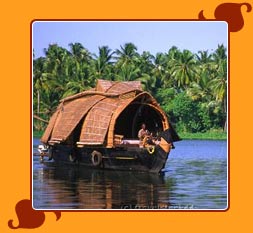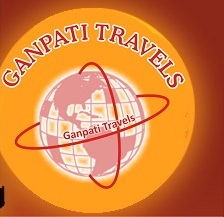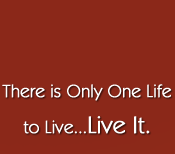The Kettuvallam (houseboats in Kerala) was a large
floating structure with high loading carrying capacity was a part of
Kerala's culture and heritage over the past years. houseboats / Kettuvallam
of Kerala could sail harnessing wild energy. A journey through the lagoon is
interesting, passing through sleepy villages, busy boat jetties and vibrant
celebrations.

The
boat glides across the shimmering blue waters with gorgeous green and
fringed edges.The small cargo boats called Kettuvalloms are frequently used
in the waterways for the above purpose. "Kettu" literally means to
tie up and "Vallom" means " boats". The boats played a
major role in the economic development of ancient Kerala, moving cargo and
men from the very nook and corner of otherwise unreachable area, cutting
across the length and breadth of the land.Fifty years ago, there were more
than 5000 kettuvallom / houseboats in the backwaters of Kerala, mainly used
for transporting goods.
Houseboats are olden day rice boats, which
were used to carry the harvest from one part of the other place to go safely
as eco friendly, no mechanized, centuries houseboats / Kettuvallam of Kerala
have been roaming in the backwaters transporting men and materials to
different destinations. Due to its sheer size and shape, Kettuvallam
(houseboats) can carry load, which is more than thrice that of a cargo
truck.
It was the important mode of transportation in coastal
Kerala just because of its accessibility to the most remote areas. As time
passed, the scene changed gradually. Motorized road, rail and air
transportation scored over the slow and staid country boat, with people
opting for speed over charm. During the time when road and rail
transportation was expensive or unavailable, traders used this as a form of
main transportation in the inland waterways. The huseboats had enough
facilities for cooking and sleeping for the boatmen. Sometimes boatmen's
families also accompanied them.
A standard houseboat, which could
be about 100 feet long, can hold up to 30 tons, and that is as much as three
big lorries can . For the royalty these houseboats even became comfortable
living quarters. It was the important mode of transportation in coastal
Kerala just because of its accessibility to the most remote areas. However,
the scenario changed. Motorized road, rail and air transportation scored
over the slow and staid country boat, with people opting for speed.
Colour
and texture of Houseboats The colour of houseboats Valavara is
yellowish brown, which is the colour of the natural materials like panambu,
coir and bamboo. It is a warmer colour comparing to the colour of the
surrounding atmosphere. This gives a nice feeling of being inside the
Vallam. Bamboo is used for the framework of the roof and splits of Bamboo
are used for weaving mat for roofing. Bamboo poles are used for punting the
Vallams. It is strong fiber and absorbs more carbon. Latest houseboats have
modern interiors.
Lighting inside the houseboats
Lights and the patterns of lights and darkness itcreates can call
our attention to one a rear of our room de-emphasize others and thereby
create division of spaces. At night the traditional hurricane lamp is used
to light the interiors. Usually each one is hung from the ridge of Valavara
one at front, one at rear and one or two accordingly for the living spaces.
And mostly for half of a month there will be moonlight, which gives enough
light, reflected on water. Modern houseboats uses Generator sets or Solar
power to provide lighting and other power requirements inside the
houseboats.
Eco friendly Our houseboats
Keeping bio-septic tank (eco friendly toilets), tested and certified by the
Central Research Laboratory (CRL), fitted to collect the effluents thereby
avoiding pollution to the backwaters






